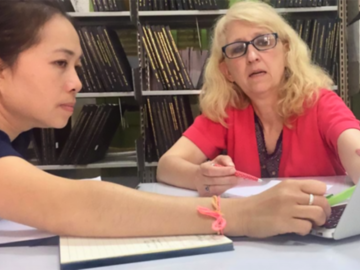June 7, 2021
'All health is global, and a global health lens and perspective are critical'

Three University of Calgary Internationalization Achievement Award winners with more than 50 years of combined global health experience say global health programs are unlocking innovation and providing opportunities to improve medical education.
Dr. Gwen Hollaar, MD, assistant dean of Global Health Education Development at the Indigenous, Local and Global Health Office (ILGH) in the Cumming School of Medicine (CSM) and Dr. Lash Gedamu, PhD, professor, department of biological sciences in the Faculty of Science and adjunct professor of biochemistry and molecular biology in the CSM, were recipients of this year’s Career Achievement awards. Dr. Jenn Brenner, MD, director of Global Maternal Child Health at the ILGH accepted the International Program award for Mama na Mtoto (MnM) on behalf of the MnM team.
“The past 12 months have illustrated that all health is global, and a global health lens and perspective are critical as we strive for better health and well-being for all,” says Brenner.
She hopes the pandemic is helping people understand how intertwined our health and health systems are around the world. There is much we can learn from each other including how to be innovative with less in the face of challenges.
For example, the current global health initiative in southwest Uganda, Healthy Adolescents and Young Adults (HAY!), in partnership with the CSM, Healthy Child Uganda (HCU) and Mbarara University of Science and Technology pivoted its programming due to COVID-19 restrictions. The Ugandan team has adapted its communications from in-person platforms to virtual and even radio where internet isn’t as accessible.
The team has also proposed a way to reach some of the more remote villages to share impactful digital stories by training community members to lead discussions after film screenings and using rechargeable projectors to address the lack of electricity.
Brenner was the UCalgary lead of MnM, a four-year maternal, newborn and child health initiative focused on reducing maternal and newborn mortality in Tanzania, working with longtime global health partners HCU and the Catholic University of Science and Technology. She is also the UCalgary lead for HAY!
Pursuing greater health equity globally
For Hollaar, global health is also about skills and capabilities gained through discussions, partnerships and initiatives that immerse Canadian students in international communities.
“Educational competencies include such things as understanding what health disparities exist and strategies to move towards greater equity, understanding how social and environmental context influences health and disease, understanding how we collaborate, partner and communicate to promote health equity, understanding how advocacy and social justice are part of our duties as health-care professionals, understanding the limitations of our perspectives and the need for diverse voices to shape better health-care access,” says Hollaar.
She has been an educational leader in global health at UCalgary for more than 18 years. Her career has surrounded her with a community that has taught one another to listen to each other, to value each other and to learn from each other.
Hollaar was awarded one of two UCalgary Internationalization Career Achievement Awards this year for her dedication to sharing her knowledge, strengthening academic institutions around the world and pursuing co-developed solutions to challenges with global health partners through programs such as the International Institute for Medical Education Leadership.
Sustainability and capacity development
Gedamu approaches global health experiences with a vision to create sustainability, scalability and growth. He says ideally you want to eventually work yourself out of a role like his because you have created a foundation on which the program can continue and grow under the supervision of local leaders.
Gedamu is responsible for catalyzing the Bioinformatics and Molecular Biology Training programs through ILGH. He emphasizes the importance of partnerships and of being open to learning from others. And he says students and faculty who participate in global health initiatives and partnerships have enriched educational experiences, develop cultural competency and often come away as stronger leaders.
Gedamu is the second Internationalization Career Achievement Award winner honoured this year. His work has strengthened research and education capacity in institutes across Ethiopia. Students he has worked with have become leaders who are carrying on his vision of sustainability and increased research and training capacity.
Although COVID-19 restrictions have hampered international travel preventing face-to-face experiences, Brenner, Hollaar and Gedamu adapt their global health work to the current norm.
To learn more about global health opportunities and funding for students and faculty, or the UCalgary’s Global Engagement Plan, check out the websites of the Indigenous, Local and Global Health Office and University of Calgary International. Nominations for next year’s University of Calgary Internationalization Achievement Awards open the end of June.
The Cumming School of Medicine's Indigenous, Local & Global Health Office works to create the future of health and social equity at home and abroad. The office is committed to collaborating with communities to promote engagement, advance equity, inform curriculum and research, and co-design initiatives for impact.
Healthy Adolescents and Young People implementation is undertaken with the financial support of the Government of Canada provided through Global Affairs Canada.






